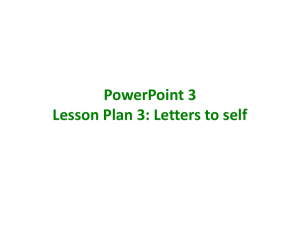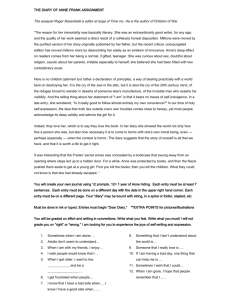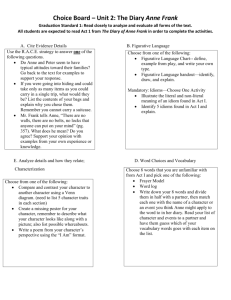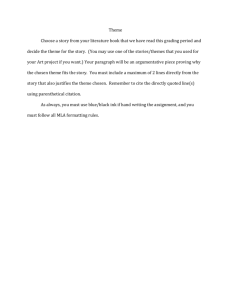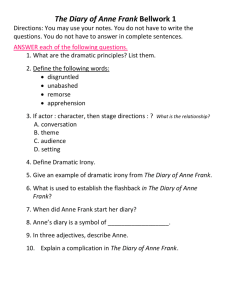Lessons from The Diary of Anne Frank
advertisement
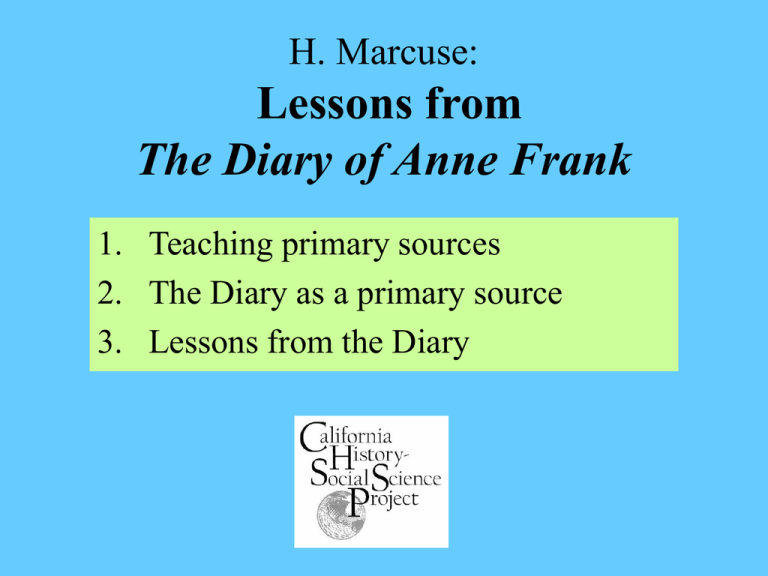
H. Marcuse: Lessons from The Diary of Anne Frank 1. Teaching primary sources 2. The Diary as a primary source 3. Lessons from the Diary Teaching Primary Sources • Educational research (Wineburg, AERJ, 1991) – Historians engage in dialog with sources – Students read to glean information • Consequences: – Students simulate without learning – Students trust textbooks more than docs., BUT (study by Terrie Epstein, Social Education, 1997): whites: textbooks, teachers, library Blacks: families, teachers, movies Cognitive Learning Studies • Text + meaningful images best – No matter for “experienced learners” – Visuals help inexperienced learners • “Coolness factor” – Motivates and engages students • Distraction effect – Decorative color, motion decrease learning Learning process • Engage the students, “pick them up where they are” – Package for interest, not distraction • Crucial: Teacher modeling of learning – Don’t “know it all” (present only facts) – Show process of arriving at conclusions – Engage in dialog with sources (and students) The Diary as a Primary Source • Historical context (personal) – Anne born in Germany, 1929 – Fled to Holland, 1933 • Historical context (structural) – Great Depression – Radical solutions appeal to many Simultaneity: for connection • Anne 4 years old in 1933 • Biographical connection – My father born in 1929 – Students’ grandparents – Anne would be 73 now • Timeline exercise? Core for ALL Lessons • READ THE DIARY! – It has definite literary quality – Anne supplies the context • THEN discuss other issues – History of the WW2, Germany, Holocaust – Racism, persecution – Quality, goals of life My lesson today • The Diary as a primary source • Original vs. authentic – Reliable, true to the original • Many versions of the Diary: Many truths? Content Standards 10.8 Students analyze the causes and consequences of World War II. 5. Analyze the Nazi policy of pursuing racial purity, especially against the European Jews; its transformation into the Final Solution; and the Holocaust that resulted in the murder of six million Jewish civilians. 6. Discuss the human costs of the war, with particular attention to the civilian and military losses in Russia, Germany, Britain, the United States, China, and Japan. Analysis Skills Standards “to be learned through, and applied to, the content standards” • K-5: Students differentiate between primary and secondary sources. Also: sequence, similarity/ difference, connection, location • 6-8: distinguish fact from opinion; detect different historical points of view • 9-12 Historical Research, Evidence, and Point of View 1. Students distinguish valid arguments from fallacious arguments in historical interpretations. 2. Students identify bias and prejudice in historical interpretations. 3. Students evaluate debates among historians concerning alternative interpretations of the past, including an analysis of authors' use of evidence and the distinctions between sound generalizations and misleading oversimplifications. 3 Basic Versions of Anne’s Diary Version a: Anne’s original (June 1942-Aug. 1944) Version b: Anne’s rewrite (May-August 1944) Version c: Anne’s father’s synthetic edit (1945-46) “typescripts I & II” More versions, more audiences • Dutch publisher: T II - 15 deletions (1947) – French translation (1950) • • • • German translation (1950): typescript II English translation (1952): hybrid (7 back in) Critical edition of versions a, b, c (1986) Definitive edition (1995) – Redoes synthesis by Otto in 1945-46 • Stage versions (1955; 1997); film (1959) Old vs. New Technology • For some things, bells and whistles don’t work as well • Now for text analysis, word by word --I’ll use “old technology”: overhead proj.

